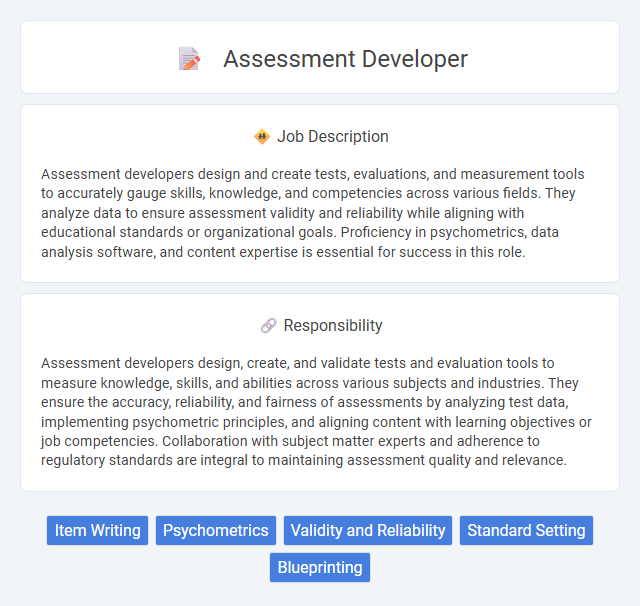
Assessment developers design and create tests, evaluations, and measurement tools to accurately gauge skills, knowledge, and competencies across various fields. They analyze data to ensure assessment validity and reliability while aligning with educational standards or organizational goals. Proficiency in psychometrics, data analysis software, and content expertise is essential for success in this role.
Individuals with strong analytical skills and attention to detail are likely well-suited for an assessment developer role. Those who enjoy creating and validating tests, interpreting data, and improving evaluation processes may find this job aligns with their skills and interests. Candidates lacking patience for iterative testing or discomfort with technical tools might face challenges adapting to this position.
Qualification
Assessment developer jobs require a strong background in educational psychology, assessment design, and data analysis. Candidates should possess advanced skills in psychometrics, test construction, and familiarity with learning management systems (LMS) and assessment platforms. A degree in education, psychology, or a related field, combined with experience in creating valid and reliable assessments, enhances the qualification profile for this role.
Responsibility
Assessment developers design, create, and validate tests and evaluation tools to measure knowledge, skills, and abilities across various subjects and industries. They ensure the accuracy, reliability, and fairness of assessments by analyzing test data, implementing psychometric principles, and aligning content with learning objectives or job competencies. Collaboration with subject matter experts and adherence to regulatory standards are integral to maintaining assessment quality and relevance.
Benefit
Assessment developer roles likely offer benefits such as competitive salaries and opportunities for professional growth within the educational technology sector. Employees may receive access to innovative tools and ongoing training that enhance skill development and career advancement. The position probably provides a collaborative work environment that supports creativity and continuous improvement in assessment design.
Challenge
Assessment developer roles likely involve complex challenges such as designing valid, reliable, and fair evaluation tools that accurately measure learning outcomes. Navigating diverse subject matter and adapting assessments for various learner needs may require advanced analytical and creative problem-solving skills. There is probably ongoing pressure to stay updated with educational standards and technology trends to ensure assessment relevance and efficacy.
Career Advancement
Assessment developers play a critical role in designing and implementing evaluation tools that measure learning outcomes and employee performance. Expertise in psychometrics, instructional design, and data analysis enhances career advancement opportunities, often leading to senior roles such as assessment manager or director of learning and development. Continuous skill development in emerging technologies and assessment methodologies is essential for progress within educational institutions and corporate training environments.
Key Terms
Item Writing
Assessment developers specialize in crafting high-quality test items that accurately measure knowledge, skills, and abilities across various subjects. Expertise in item writing includes constructing clear, unbiased questions aligned with learning objectives, adhering to psychometric principles, and ensuring diverse item types such as multiple-choice, short answer, and essay items. Proficiency in utilizing assessment software and following industry standards enhances the reliability and validity of educational and certification exams.
Psychometrics
Assessment developers specializing in psychometrics design and validate tests that measure cognitive abilities, personality traits, and educational outcomes with statistical precision. They apply advanced psychometric techniques such as Item Response Theory (IRT), Classical Test Theory (CTT), and factor analysis to ensure reliability and validity in assessments. Proficiency in software like R, SPSS, or Python is essential for data analysis, test scaling, and interpretation of psychological measurement data.
Validity and Reliability
An Assessment Developer designs and creates evaluation tools that ensure validity by accurately measuring the intended skills and knowledge. They implement rigorous testing protocols and statistical analyses to establish reliability, guaranteeing consistent and reproducible results across diverse populations and settings. Expertise in psychometrics and educational measurement principles is essential to maintain the integrity of assessment outcomes.
Standard Setting
Assessment developers specializing in Standard Setting design and implement rigorous frameworks to ensure test score interpretations align with predetermined achievement levels. They collaborate with subject matter experts to establish cut scores through methodologies such as Angoff, Bookmark, or Contrasting Groups, enhancing the validity and reliability of assessments. Proficiency in psychometrics and data analysis tools is essential for creating defensible and equitable standards in educational and professional evaluations.
Blueprinting
Assessment developers specializing in blueprinting design structured test plans that align learning objectives with measurable outcomes, ensuring valid and reliable assessments. They analyze curriculum standards and content domains to create detailed test blueprints, guiding item writers in producing relevant questions. Expertise in blueprinting enhances assessment quality by balancing content coverage and cognitive skill levels, which supports effective evaluation of learner competencies.
 kuljobs.com
kuljobs.com